Big Red Book
Celebrating television's This Is Your Life
Stéphane GRAPPELLI (1908-1997)

THIS IS YOUR LIFE - Stéphane Grappelli, jazz violinist, was surprised by Eamonn Andrews - with the help of Petula Clark - as he left his flat on London's King's Road, having been led to believe he was due to perform at the Dorchester Hotel.
Stéphane, who was born in Paris and began playing the violin at the age of 12, studied at the Conservatoire de Paris. After several years of busking on the streets and playing in the pit orchestra of the Theatre Gaumont, he discovered jazz, which led him to develop a jazz-influenced violin style.
He formed the Quintette du Hot Club de France, one of the first all-string jazz bands with guitarist Django Reinhardt, before relocating to the UK, where he teamed up with pianist George Shearing. Having released numerous recordings and performed concerts worldwide, Stéphane became known as "the grandfather of jazz violinists".
"Yes - but what kind of life!"
programme details...
- Edition No: 512
- Subject No: 509
- Broadcast date: Wed 21 Feb 1979
- Broadcast time: 7.00-7.30pm
- Recorded: Wed 24 Jan 1979
- Venue: New London Theatre
- Series: 19
- Edition: 18
- Code name: Grape
on the guest list...
- Petula Clark
- Ed Baxter
- John Etheridge
- Phil Bates
- Diz Disley
- Claude Wolff
- Louis Vola
- Evelyne - daughter
- Gilles - grandson
- Stéphane - grandson
- Jean Sablon
- Dr Jack Harrisson
- Audrey Harrisson
- Douglas Byng
- Yehudi Menuhin - live link
- Nigel Kennedy
- Ada DuConge Filmed tributes:
- Sacha Distel
- George Shearing
- Cleo Laine
- John Dankworth
- Jeanne Moreau
related appearances...
- Michael Parkinson - Nov 1978
- Nigel Kennedy - Mar 1990
- George Shearing - Feb 1992
- Julian Bream - Feb 1997
production team...
- Researchers: Maurice Leonard, Sue Jerrard
- Writers: Tom Brennand, Roy Bottomley
- Directors: Royston Mayoh, Terry Yarwood
- Producer: Jack Crawshaw
- names above in bold indicate subjects of This Is Your Life
covering all the notes
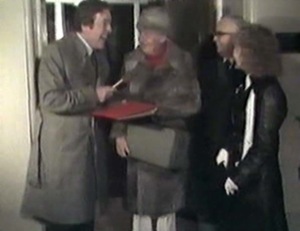
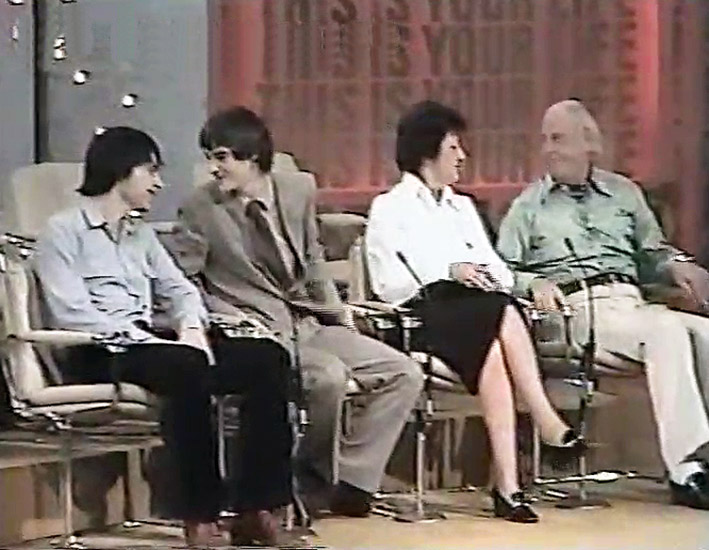
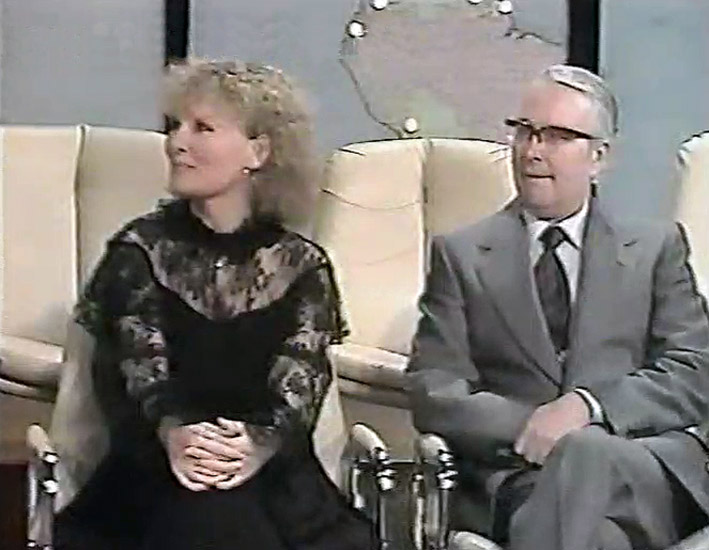
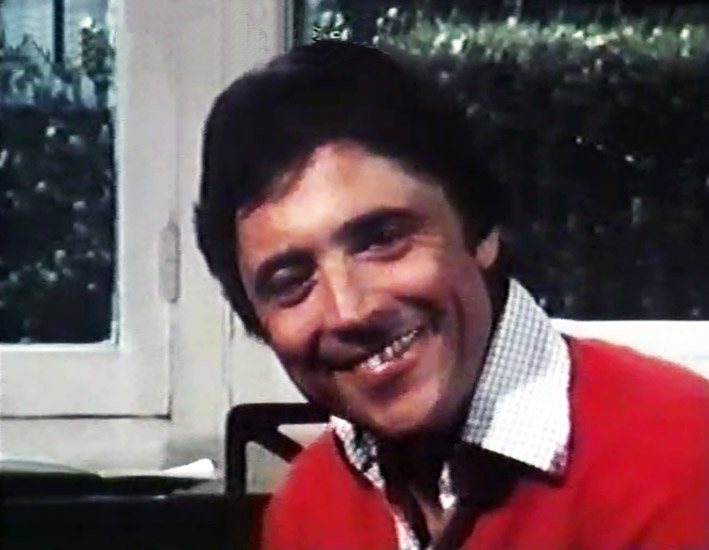
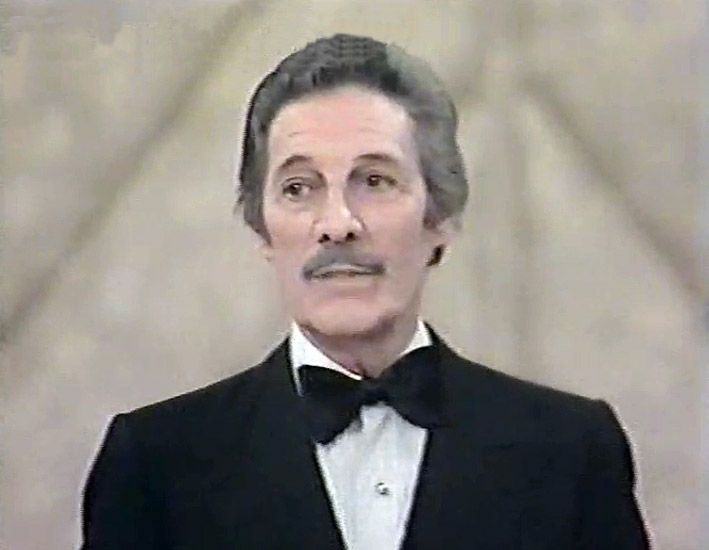
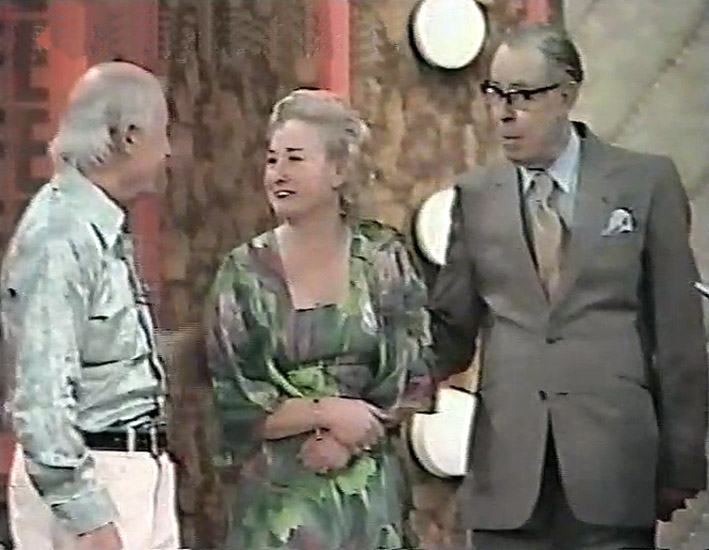
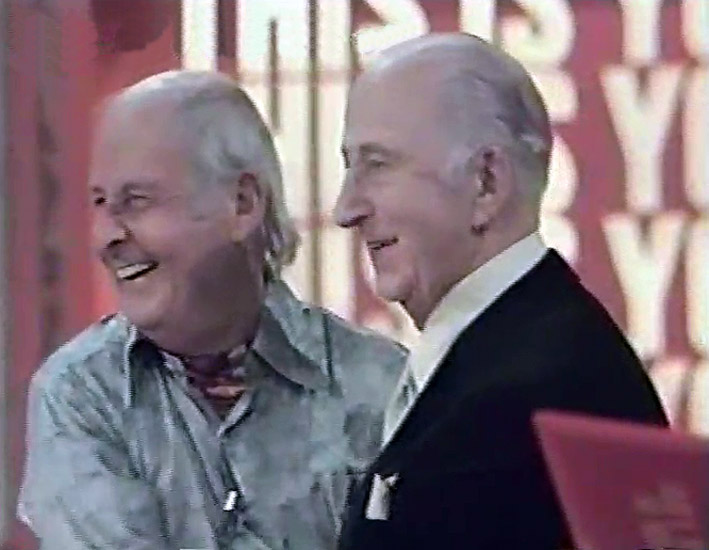
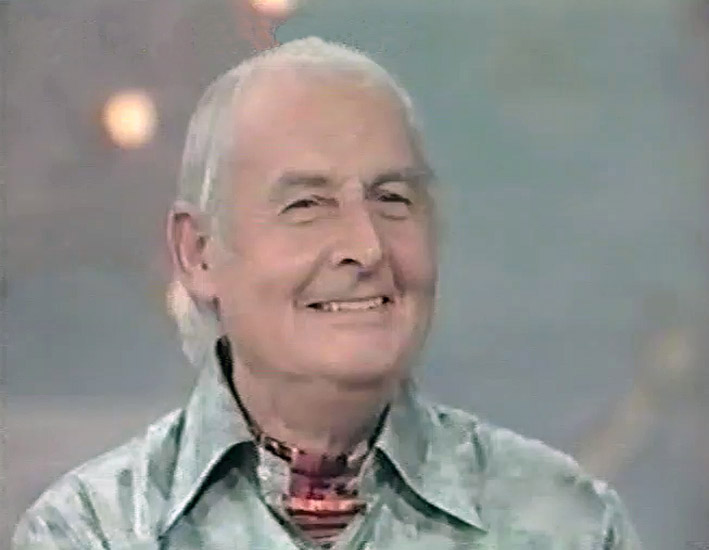
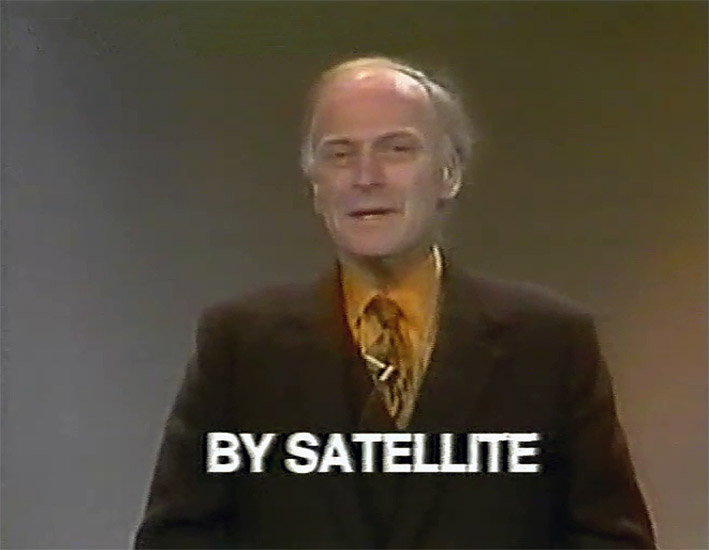
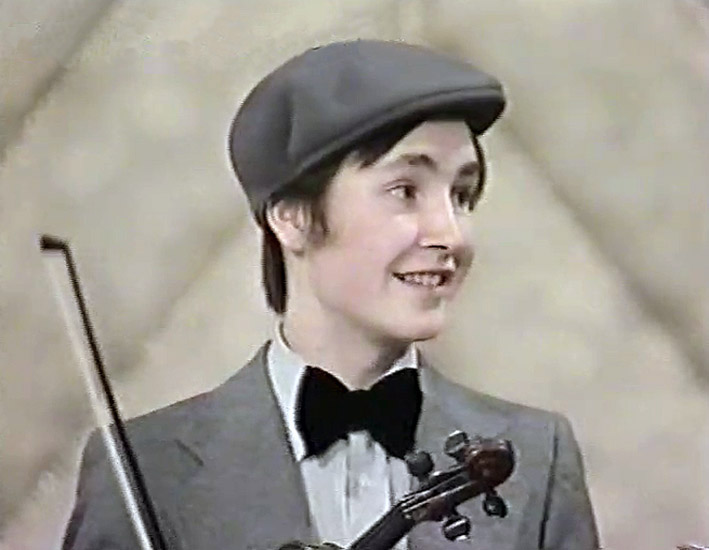
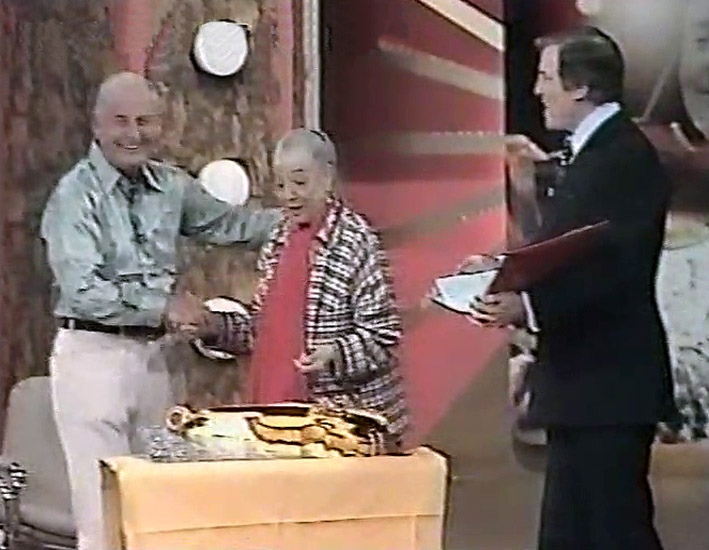
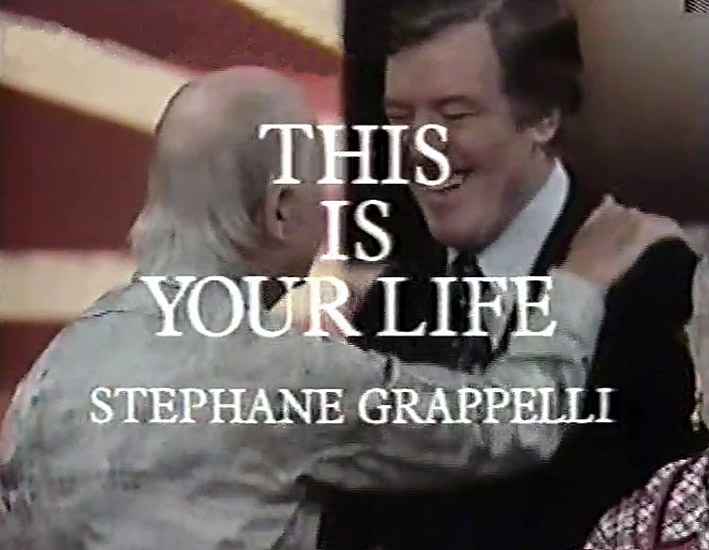
Screenshots of Stéphane Grappelli This Is Your Life
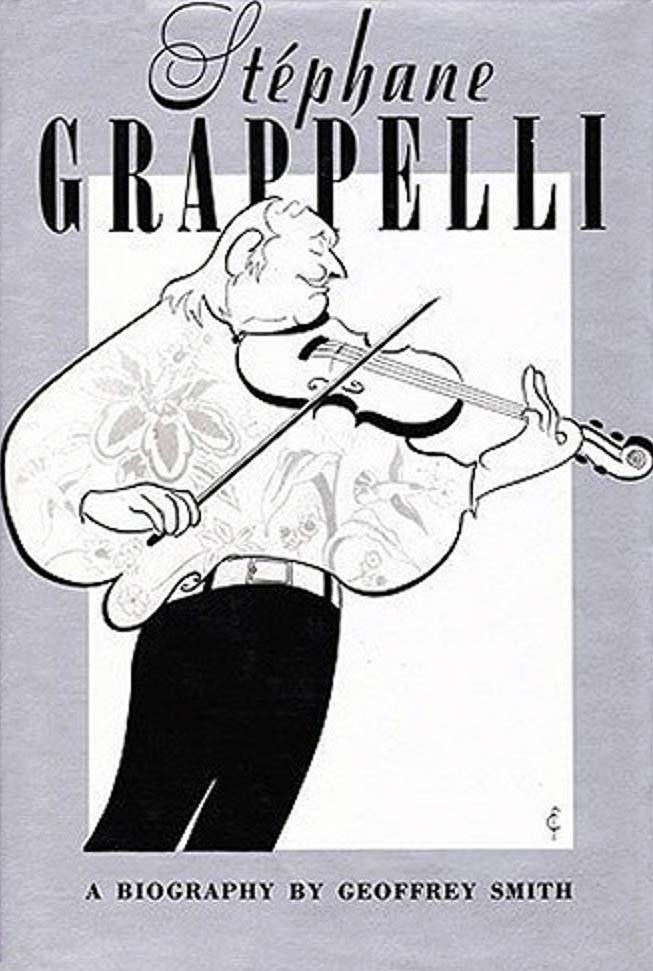
A few weeks later, on 24 January 1979, it was Stéphane's turn to be surprised, the result of plenty of forethought.
He was the subject of Thames TV's This is Your Life, and the programme gathered together figures from most of the eras of his life: Louis Vola and Jean Sablon, Jack and Audrey Harrisson, Petula Clark (who as a child star had toured with Stéphane in the war) and Sacha Distel. George Shearing, Yehudi Menuhin and the British jazz stars John Dankworth and Cleo Laine appeared by satellite transmission from the States.
There was his family - Eveline and her sons Stéphane (known as 'young Steph') and Giles - as well as Diz, John Etheridge and Phil Bates. But the biggest surprise came at the close, when the one and only Bricktop emerged, to Stéphane's total amazement.
After the show, there was an impromptu jam session, which reached its climax with Bricktop singing 'St Louis Blues' to his accompaniment.
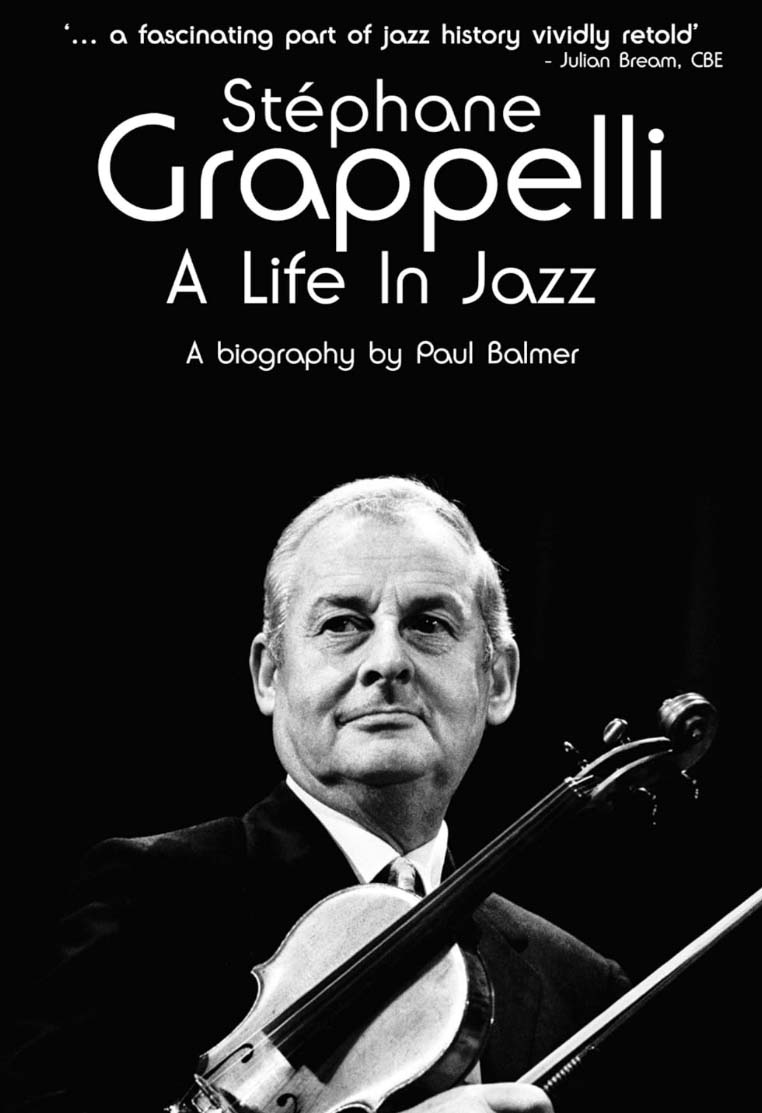
By 1979, Stéphane was again a well-established celebrity, and this inevitably led to very public surprises. The UK and US television show This Is Your Life celebrates the great and the good as their fame peaks. In its early days, it was almost a prelude to retirement, a reflective look back at a career, with nostalgic input from friends and family. Part of the fun for the audience is an element of surprise for the subject, and according to agent Ed Baxter, this was certainly the case for Stéphane as the fateful hour arrived: 'He believed he was doing a concert and kept asking for Diz. He hadn't a clue. He thought he was going to the Dorchester, and Diz would be along. And Steph was tuning up: "Where's Diz? Where's Diz?" 'We'll get Diz in a minute, Steph, but let's take a walk round here for a minute, OK?'
On the Thames Television recording, Stéphane leaves his hotel to be greeted by the show's host, Eamonn Andrews, and a surprising chauffeur, the singer Petula Clark. Stéphane looks bemused but happy as Eamonn tells him, 'Tonight, Stéphane Grappelli, this is your life.' Stéphane then turns to Petula and chuckles, 'But what kind of life?'
Driving through the snow-covered London streets, the entourage arrives at the studios, and Stéphane is escorted by Ed and Petula through a delighted audience. Stéphane clearly hasn't had time to prepare and is wearing a shirt straight from the laundry bag with neat, square creases in all the wrong places. According to Petula, Stéphane even asked, off camera, 'Who is this Eamonn Andrews?', and, worried about missing his concert, 'Will I get my money?'
It transpires that Petula has flown over especially from Geneva to chauffeur her old friend. 'I've been a fan for many years,' she tells the television audience, 'and first saw him at Club St Germain as part of the audience with my then-husband-to-be, Claude Wolfe.'
Eamonn Andrews then brings on the current band - Phil Bates on bass and John Etheridge and Diz Disley on guitars - reassuring Stéphane that he hasn't missed the concert, and then reminds the audience that Stéphane has recently been awarded La Légion d'Honneur. He then introduces Stéphane's countryman, Sacha Distel, currently famous for his pop success with 'Raindrops Keep Falling On My Head', who, it turns out, had met Stéphane during his years at the Paris Hilton and brought him to London to work the Palladium together.
Stéphane's next surprise is the offstage voice of Louis Vola, which he clearly doesn't recognise, but all is forgotten in Gallic embraces when Stéphane immediately recognises the face of his old friend. (It later transpires that Vola had issued the This Is Your Life team with a set of conditions for his appearance. At the age of 77, Vola had been tracked down by Diz, who found him working the club Scherezade in Paris, where, not content with playing bass, the veteran was doubling on piano and drums. He insisted that the Thames Television fee should cover his three-night absence from the bandstand.)
Having recounted a version of the founding of The Hot Club Quintet, Eamonn next refers back to Stéphane's first violin and asks how he learned to play it, and Stéphane replies that he played with it like it was a toy. There then follows an emotional reunion with Stéphane's daughter, Evelyne, with kisses for Evelyne and hugs for his grandsons, Gilles and young Stéphane.
The recording took place on 24 January, and Eammon next refers to this early birthday celebration for Stéphane. The context is the introduction of Stéphane Jnr, born unexpectedly 23 years ago at Stéphane's 48th birthday party. (Stéphane was very fond of his grandsons and had a particular soft spot for his young namesake. Ed Baxter later remarked to me on Stéphane's generosity towards the two boys.)
The next guest is Jean Sablon, the first of the great French crooners, two years older than Stéphane and a big star in Paris. Sablon famously cited World War I and the influx of US Army orchestras as a turning point in French popular music. Eamonn refers to Stéphane and Jean's early recordings together, suggesting that these took place in 1932, but this seems unlikely. Certainly, Stéphane and Django recorded with Sablon in 1934, scoring a success with 'Who's Afraid Of The Big Bad Wolf?'. He tells a funny story of always being invited to Stéphane's house but never quite managing it, until one day he at last phoned to accept the offer, only to find that Stéphane had sold the house to buy a violin.
In a technological breakthrough for the 1970s, there follows a live satellite link-up with New York, where George Shearing recounts the tale of how he disturbed Stéphane during the Blitz by reading Braille in the dark, referring to the pub in Lambeth where they met. Then, he offers a tribute to Stéphane: 'You are an international jazz star. Thank you for 40 years of friendship, and may there be many more.'
There next follows a clip from the 1946 film Stéphane Grappelli And His Quartet, featuring, appropriately enough, the tune Evelyne, with Shearing playing excellent forward-looking piano in his last recording before leaving for American stardom.
Stéphane is delighted to see his next guests, Jack and Audrey Harrison from Devon, who relate the genesis of 'Yellow-House Stomp', a tribute to their country home where Stéphane had convalesced during the war. He and George Shearing supposedly wrote the opus on a restaurant tablecloth.
Next, Douglas Byng makes a surprise appearance. This raffish gent, born in 1893, was the queen of cabaret camp and spent most of his career in drag as a pantomime dame. In the '20s and '30s, he was a leading light of the sophisticated international set alongside Noël Coward and famously sang 'Miss Otis Regrets' in drag for Cole Porter.
Cleo Laine and John Dankworth then sing for Stéphane, a tribute prerecorded in their converted stables at Wavendon, which became a popular music mecca and to which Stéphane was apparently a regular visitor. By this time, the Dankworths were already a significant part of Britain's popular-music scene. Born in 1927, John had come to jazz via the Royal Academy of Music and 'Geraldo's Navy', the affectionate nickname for an apprenticeship to the transatlantic cruise bands. He formed his own band in 1950, then The Dankworth Seven became eight in 1951 with the addition of Cleo Laine (née Clementina Dinah Campbell), who hailed from London's Southall and had since gone on to sell out Carnegie Hall. Her live album of that was even nominated for a Grammy.
No doubt Stéphane would have enjoyed the Dankworths' eclectic approach to music, with jazz, Bach, Shakespeare and samba all well represented. In fact, their son, Alec, would eventually guest with Stéphane in concert as an accomplished bass player. By the 1970s, Cleo was at last receiving due recognition in the United States.
Also regretting the need to pre-record his tribute is Yehudi Menuhin, speaking from Columbus, Ohio. Yehudi remembers his Parkinson Show appearance with Stéphane and reveals that he 'always wanted to improvise like that'.
Another violinist then performs off-camera with a spirited attempt at 'Tiger Rag', and this turns out to be Nigel Kennedy, enthusiastic in cloth cap and bow tie, who reminisces about playing with Stéphane at Carnegie Hall. Next, told off by Stéphane for his irreverent dangling of his violin, Nigel adds a tribute to the fiddler who, he says, 'brings a life in his playing which classical music often lacks, the music of the moment.'
An unexpected pre-recorded tribute follows from the great French actress Jean Moreau, who had recently worked with Stéphane on Les Valseuses. She tells of accompanying Stéphane to his 1975 Légion d'Honneur ceremony.
The next guest is even more of a surprise, the exuberant Bricktop, who recalls the Paris clubs of the 1930s, announcing offstage, 'Remember, Stéphane? I called you my baby?' With reminders of 'Django de Reinhardt' and his unpredictability, the legendary club owner eventually presents Stéphane with a birthday cake in the shape of a violin, at which Stéphane retorts, 'I can't play that!' As a fitting tribute, Bricktop confides, 'Nobody in the world would have brought me in this kind of weather from New York, but I'm so happy.'
With nothing left to follow that, Eamonn presents Stéphane with the big red book and the famous words, 'Stéphane Grappelli, this is your life.'
Typically, Stéphane was concerned about the audience, and as the cameras stopped recording, Ed Baxter remembers that he gave the studio fans a little concert: 'Steph had the boys play - Disley, Phil Bates, John and himself, and Bricktop sang. She said, "We're going to do the 'St Louis Blues'." Pet Clark sang a song. He got everyone there involved in the thing - Jean Sablon singing, Louis Vola playing the bass.'
No doubt this was an emotional day for Stéphane, especially when faced with the notion of retirement. But who in that 1979 audience could have expected that the French wizard had a career before him of another 18 years?
Series 19 subjects
Alice Goldberger | Michael Parkinson | Mary O'Hara | Barbara Kelly | Terry Scott | Jimmy Shand | Eric Newby | Patricia NealDavid Bellamy | Muhammad Ali | Vera Lynn | Naomi James | Leslie Thomas | James Galway | Elaine Paige | Lord Lovat
Kevin Keegan | Stéphane Grappelli | Robert Powell | Shirley Crabtree | Peter Barkworth | Robert Law | Dinah Sheridan
JPR Williams | Joyce Pearce | Ian Ogilvy | Margaret Kelly